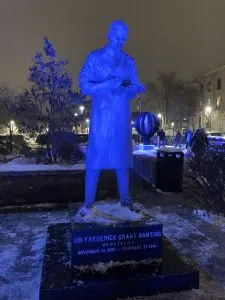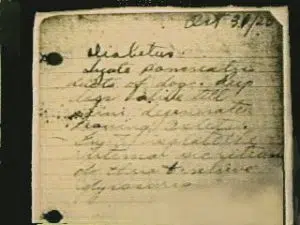A local museum was glowing blue on the evening of this year’s World Diabetes Day.
Banting House saw more than 150 attendees Thursday night.
The museum, also known as the ‘birthplace of insulin’ honoured the legacy of Sir Frederick Banting, and his discovery that would save millions of lives.
“London is known as the ‘birthplace of insulin’ because on October 31th, 1920 after a night of restless sleep, [Banting] comes up with a 25-word hypothesis,” museum curator Grant Maltman told X FM.
“[It] would lead to the discovery of insulin 10 months later after only 12 weeks of experiments.”
The event began with volunteers reciting letters.
“We read letters that people are leaving for Dr. Banting,” said Maltman.
“In his lifetime, people will write to him and he’d reply.”
The letters were written and read in several languages.
Many were written following his passing.
“Here at the museum today, people still leave letters for him.”
Nicole Pelcz, who’s battled type 1 diabetes for more than 11 years attends the event each year.
“Last year, I wrote him a letter just to thank him for allowing me to be alive,” Pelcz told X FM.
“I wish that he hadn’t passed away so young, because maybe if he was still alive, we would have a cure. But at least him [discovering] insulin has allowed me as well as many others to live a somewhat normal life.”
“I’m very thankful for him.”
The birthplace of insulin celebrates Dr. Frederick Banting’s 128th birthday on World Diabetes Day. #LdnOnt pic.twitter.com/F9SGuWVIF1
— XFM News – 106.9 The X (@XFMNews) November 15, 2019
Following letter-reading, the museum opened its doors for all to explore.
Maltman pointed out the significance of the blue lights that shone across the square.
“We’re lit up blue as part of the World Monument Challenge…. On World Diabetes Day, monuments around the world light up blue in support of the international campaign to raise awareness for the disease.”
Despite awareness, research, and 99 years after the discovery of insulin, a cure has yet to be found.
But Pelcz says she’s hopeful for the future.
“I’m [not sure] if there will be a cure in my lifetime, but technology has come a long way, so I think that over the next few years, there will be new technology to [aid] the management of diabetes.”
“If [I] met Dr. Banting in-person, I would thank him, and give him a hug.”
For Maltman, he believes the ‘father of insulin’ would feel proud on his 128th birthday.
“I think he’d be incredibly moved by the support. I think that he’d be equally upset that we haven’t found a cure for diabetes, and he would challenge us all to support [researchers], [and] find that cure.”







